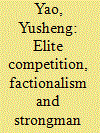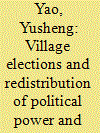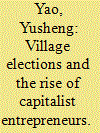| Srl | Item |
| 1 |
ID:
156262


|
|
|
|
|
| Summary/Abstract |
This study examines the elite political competition in a large agrarian village in Hubei Province. Although known locally as well-governed, this village was actually a bifurcated political community with a host of problems. The power struggle between a few members of the village’s political elite in the past two decades focused on the office of village Party secretary and produced a polarized politics of factionalism. The town Party committee played a crucial role in selecting the village’s Party secretary for economic development with dubious results. This study also examines how and why a strongman Party secretary could hold on to power for 16 years despite an increasing opposition. It reveals the governing dilemma for a village that was hard to govern and the unintended consequences of the Party’s recruitment policy for village leaders. Through the elite competition for the past two decades this study aims to capture a total picture of the village politics including its political ecology, agency and dynamics.
|
|
|
|
|
|
|
|
|
|
|
|
|
|
|
|
| 2 |
ID:
089395


|
|
|
|
|
| Publication |
2009.
|
| Summary/Abstract |
This study of competitive elections in a northern China village identifies two contradictions: one between villagers and village officials, the other between village elite and those seeking power. The one between villagers and the old leadership in the village focuses on the latter's corruption and bad governance, which had led to serious erosion and unfair distribution of the collective property. The one between villagers and the new leadership lies in the latter's failure to address the problems left by the old leadership. Both led to popular discontent and fuelled political participation. The contradiction between elite members focuses on competing for political office, which has resulted in the formation of factions and factionalism in both election and post-election politics and has become a salient feature of the village politics. The investigation of this village with governing problems found that free elections have brought about a radical redistribution of political power, but little satisfaction to villagers because their deep-seated desire for a fair redistribution of the collective property remains unfulfilled.
|
|
|
|
|
|
|
|
|
|
|
|
|
|
|
|
| 3 |
ID:
110017


|
|
|
|
|
| Publication |
2012.
|
| Summary/Abstract |
This study examines a series of four direct elections and their impact in an industrialized Chinese northern village. It finds that direct elections empowered villagers and the new economic elite to remove the old, entrenched and corrupt leadership. However, the few capitalist entrepreneurs who dominated the elections and the new leadership neither abided by the rules of political competition nor tried to govern democratically. On the other hand, villagers did not feel empowered to participate in the governing process despite the establishment of democratic institutions. After initial enthusiasm for direct elections, many villagers either became politically apathetic or felt helpless and nostalgic for the return of a benevolent authoritarian leader. This study finds that after four rounds of direct elections, little progress had been made in democratic elections and governance. This was mainly because the new economic elite did not want to be checked by democratic rules and institutions while villagers had not learned to use democratic institutions to hold their elected leaders accountable.
|
|
|
|
|
|
|
|
|
|
|
|
|
|
|
|